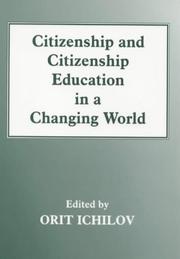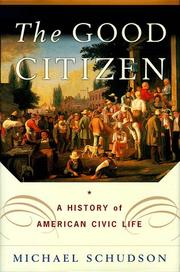| Listing 1 - 9 of 9 |
Sort by
|
Book
ISBN: 9783893318254 Year: 2008 Publisher: Bonn : Bundeszentrale für politische Bildung,
Abstract | Keywords | Export | Availability | Bookmark
 Loading...
Loading...Choose an application
- Reference Manager
- EndNote
- RefWorks (Direct export to RefWorks)
Book
ISBN: 9087907958 9789087907952 9789087907945 908790794X 9789087907952 Year: 2009 Publisher: Rotterdam Boston
Abstract | Keywords | Export | Availability | Bookmark
 Loading...
Loading...Choose an application
- Reference Manager
- EndNote
- RefWorks (Direct export to RefWorks)
As we move forward well into the 21st century most citizens around the globe seemingly accept the rudiments of a democratic citizenship. And yet in spite of this broad acceptance, a clear articulation of what democratic citizenship entails remains somewhat elusive. In this book, Hyslop-Margison and Thayer achieve two critically important objectives in response to this problem. First, they successfully articulate the threat to democracy posed by current citizenship education programs that adopt a largely instrumental framework fostering passivity and compliance by protecting the established parameters of neo-liberal social design. Second, they show a way out of this anti-democratic trap by illustrating how critical theory, with its marvelous ability to provide trenchant critiques of capitalism and turn those critiques into concrete political action, provides the ideal pedagogical approach to educate our students effectively as future democratic citizens. The authors critique the conditions of modern democratic citizenship and distinguish a robust, or thick, version of citizenship based on citizen agency and participation in the construction of social reality from contemporary models that undermine citizen engagement. They contend that it is only through critical theory and the political agency it inspires that meaningful democratic change can and must occur. Hence, the role of education in their view is not merely to prepare students for a new economic reality, but to prepare them instead to shape that reality in more progressive and socially just ways. This book eloquently argues that the citizenship mission of schools ought to teach students what is possible rather than simply objectifying them as human capital being prepared for the inevitable impact of the policies determined by others.
Book
Year: 1950 Publisher: [New York] : Citizenship Clearing House,
Abstract | Keywords | Export | Availability | Bookmark
 Loading...
Loading...Choose an application
- Reference Manager
- EndNote
- RefWorks (Direct export to RefWorks)
Civics --- Education à la citoyenneté --- Study and teaching
Book
ISBN: 9781948908153 Year: 2019 Publisher: Reno : University of Nevada Press,
Abstract | Keywords | Export | Availability | Bookmark
 Loading...
Loading...Choose an application
- Reference Manager
- EndNote
- RefWorks (Direct export to RefWorks)
San Francisco is known and loved around the world for its iconic man-made structures, such as the Golden Gate Bridge, cable cars, and Transamerica Pyramid. Yet its Civic Center, with the grandest collection of monumental municipal buildings in the United States, is often overlooked, drawing less global and local interest, despite its being an urban planning marvel featuring thirteen government office and cultural buildings. In The San Francisco Civic Center , James Haas tells the complete story of San Francisco's Civic Center and how it became one of the most complete developments envisioned by any American city. Originally planned and designed by John Galen Howard in 1912, the San Francisco Civic Center is considered in both design and materials one of the finest achievements of the American reformist City Beautiful movement, an urban design movement that began more than a century ago. Haas meticulously unravels the Civic Center's story of perseverance and dysfunction, providing an understanding and appreciation of this local and national treasure. He discusses why the Civic Center was built, how it became central to the urban planning initiatives of San Francisco in the early twentieth century, and how the site held onto its founders' vision despite heated public debates about its function and achievement. He also delves into the vision for the future and related national trends in city planning and the architectural and art movements that influenced those trends. Riddled with inspiration and leadership as well as controversy, The San Francisco Civic Center , much like the complex itself, is a stunning manifestation of the confident spirit of one of America's most dynamic and creative cities.
Urbanisme --- Villes --- Éducation à la citoyenneté --- Embellissement --- Centres

ISBN: 0713002158 0713040351 1315822008 1317827562 1317827570 Year: 1998 Publisher: London Woburn Press
Abstract | Keywords | Export | Availability | Bookmark
 Loading...
Loading...Choose an application
- Reference Manager
- EndNote
- RefWorks (Direct export to RefWorks)
Political, economic, technological and cultural changes have taken place all over the globe, changes which have transformed the meanings of citizenship and citizenship education. This volume represents an effort to analyze the implications of these changes.
Civics --- Citizenship --- Education à la citoyenneté --- Education civique --- Study and teaching. --- Study and teaching --- #PBIB:2002.4 --- Historische en vergelijkende pedagogiek --- Historische en vergelijkende pedagogiek. --- Education à la citoyenneté

ISBN: 0684827298 Year: 1998 Publisher: New York [etc.] Free Press
Abstract | Keywords | Export | Availability | Bookmark
 Loading...
Loading...Choose an application
- Reference Manager
- EndNote
- RefWorks (Direct export to RefWorks)
Burgerdeugd [Opvoeding tot ] --- Burgerzin [Opvoeding tot ] --- Civics --- Civics [American ] --- Civisme -- Éducation --- Enseignement de la citoyenneté --- Instruction civique --- Opvoeding tot burgerdeugd --- Staatsburgerlijke opvoeding --- Staatsburgerlijke rechten en plichten in het onderwijs --- Staatsburgers -- Rechten en plichten -- Onderwijs --- Éducation civique --- Éducation du citoyen --- Éducation à la citoyenneté --- Éducation à la citoyenneté démocratique et aux droits de l'homme --- Political participation --- Political culture --- Citizenship --- Civics. --- History. --- United States --- History

ISBN: 0807860581 9780807860588 0807822612 9780807822616 9798890873521 Year: 1996 Publisher: Chapel Hill : University of North Carolina Press,
Abstract | Keywords | Export | Availability | Bookmark
 Loading...
Loading...Choose an application
- Reference Manager
- EndNote
- RefWorks (Direct export to RefWorks)
Thomas Jefferson's conviction that the health of the nation's democracy would depend on the existence of an informed citizenry has been a cornerstone of our political culture since the inception of the American republic. Even today's debates over education reform and the need to be competitive in a technologically advanced, global economy are rooted in the idea that the education of rising generations is crucial to the nation's future. In this book, Richard Brown traces the development of the ideal of an informed citizenry in the seventeenth through nineteenth centuries and assesses its continuing influence and changing meaning.
Political science --- Political socialization --- Freedom of information --- Civics --- Civics, American --- Social ethics --- Citizenship --- Political ethics --- Information, Freedom of --- Liberty of information --- Right to know --- Civil rights --- Freedom of speech --- Intellectual freedom --- Telecommunication --- Socialization, Political --- Political psychology --- Political sociology --- Socialization --- History. --- Study and teaching --- History --- Law and legislation --- Science politique --- Socialisation politique --- Liberté d'information --- Education à la citoyenneté (Enseignement secondaire) --- Histoire
Book
ISBN: 0190926147 0190926120 0190926139 9780190926106 9780190926113 0190926104 0190926112 Year: 2021 Publisher: New York, New York : Oxford University Press,
Abstract | Keywords | Export | Availability | Bookmark
 Loading...
Loading...Choose an application
- Reference Manager
- EndNote
- RefWorks (Direct export to RefWorks)
The world is in crisis. The people of the world are all connected, & rely on one another to make ethical decisions & to solve civic problems together. Ethics & civics have always mattered, but it is becoming more evident how much they matter. Teaching ethics & civics is essential to the future. This book argues that games can encourage the practice of ethics & civics. They can help people to connect, deliberate, reflect, & flourish. They can help people to reimagine systems & solve problems. Games are communities & public spheres. Like all communities, they may encourage care, connection, & respect. They may also be used for hate, disinformation, & exclusion. Games reveal humanity's compassion as well as its cruelty. This text provides research-based perspectives related to why & how people should play, make, & use games in ethics, civics, character, & social studies education.
Moral education. --- Games - Moral and ethical aspects. --- Civics - Study and teaching. --- Ethics - Study and Teaching. --- Games --- Civics --- Ethics --- Games in education --- Computerspellen. --- Ethische aspecten. --- Morale --- Éducation morale. --- Éducation à la citoyenneté. --- Study and teaching. --- Moral and ethical aspects. --- Étude et enseignement.

ISBN: 0520053885 9780520053885 Year: 1985 Publisher: Berkeley, Calif.
Abstract | Keywords | Export | Availability | Bookmark
 Loading...
Loading...Choose an application
- Reference Manager
- EndNote
- RefWorks (Direct export to RefWorks)
Sociology of culture --- United States --- American national characteristics --- Amerikaans volkskarakter --- Burgerdeugd [Opvoeding tot ] --- Burgerzin [Opvoeding tot ] --- Caractéristiques nationales américaines --- Civics --- Civics [American ] --- Civisme -- Éducation --- Enseignement de la citoyenneté --- Individualism --- Individualisme --- Instruction civique --- National characteristics [American ] --- Opvoeding tot burgerdeugd --- Staatsburgerlijke opvoeding --- Staatsburgerlijke rechten en plichten in het onderwijs --- Staatsburgers -- Rechten en plichten -- Onderwijs --- Volkskarakter [Amerikaans ] --- Éducation civique --- Éducation du citoyen --- Éducation à la citoyenneté --- Éducation à la citoyenneté démocratique et aux droits de l'homme --- National characteristics, American --- Civilization --- 308 <73> --- 316.37 <73> --- 316.6 <73> --- #KVHA:Maatschappij; Verenigde Staten --- #KVHA:American Studies --- Economics --- Equality --- Political science --- Self-interest --- Sociology --- Libertarianism --- Personalism --- Persons --- Civics, American --- Citizenship --- Political ethics --- Social ethics --- Social sciences --- Sociografie. Sociaal economische geografie. Sociale toestand--Verenigde Staten van Amerika. VSA. USA --- Identiteit. Individu en maatschappij. Persoonlijkheid--Verenigde Staten van Amerika. VSA. USA --- Gedragstheorie. Sociaal gedrag. Sociale psychologie --(gedrag en zelfconcept van het individu in de groep z.o. {159.923.33})--Verenigde Staten van Amerika. VSA. USA --- -Civics. --- Individualism. --- National characteristics, American. --- -308 <73> --- 316.6 <73> Gedragstheorie. Sociaal gedrag. Sociale psychologie --(gedrag en zelfconcept van het individu in de groep z.o. {159.923.33})--Verenigde Staten van Amerika. VSA. USA --- 316.37 <73> Identiteit. Individu en maatschappij. Persoonlijkheid--Verenigde Staten van Amerika. VSA. USA --- 308 <73> Sociografie. Sociaal economische geografie. Sociale toestand--Verenigde Staten van Amerika. VSA. USA --- Civics. --- -Civics --- 1945 --- -National characteristics [American ] --- -Sociology of culture --- United States - Civilization - 1945 --- United States of America
| Listing 1 - 9 of 9 |
Sort by
|

 Search
Search Feedback
Feedback About UniCat
About UniCat  Help
Help News
News